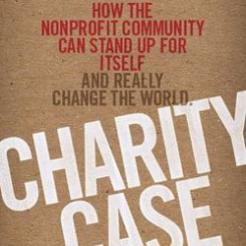The charity sector ought to spend tens of millions of pounds on advertising and PR to educate the public to judge charities by their achievements, not by their admin costs, according to prominent US fundraiser and author Dan Pallotta.
This provocative idea is one of five suggestions Pallotta makes in his latest book, Charity Case, to try to break downsome of the barriers that he claims are stopping charities from solving society’s most intractable problems.
At the same time that Charity Case was published last year, Pallotta also set up the Charity Defense Council in the US, a tax-exempt body that aims to implement the solutions he suggests in the book.
His five ideas are as follows:
1. Create an advertising and PR campaign to influence public perceptions of the charity sector
Pallotta argues that donors are currently far too focused on the issue of how much charities spend on admin, when they should be asking about their accomplishments. Instead of equating frugality with morality, the public should be asking what charities could achieve if given the right resources, and be taught that low overhead is precisely the wrong measure to be benchmarking charities by.
Pallotta wants to see full-page ads on page 3 of national newspapers, on radio and billboards and banner ads and bumper stickers, featuring pictures and stories of real people that work for real charities, alongside the headline: ‘I’m overhead’.
He uses the hugely successful US ‘Got Milk?’ campaign as an analogy to describe how perceptions of an entire industry can be changed with an effective paid-for ad push, and suggests that “US$110m is probably the minimum level of annual spending we should be considering”.
He acknowledges that “some people will be outraged” by this prospect, but goes on to argue that “not spending three pennies out of every one hundred dollars donated to charity each year, to educate the public about how that money can be used to maximum benefit and to attempt to dramatically increase their giving: that is what should have people jumping up and down in a rage”.
2. Build an anti-defamation league for the voluntary sector
This would be similar to those that already exist for minority groups such as BME communities and LGBT groups.
This body would instantly respond to and even pre-empt negative stories about charities in the national media, putting accusations of high salaries or fraudulent activity into context, and defending the sector against attacks on its activities by uninformed politicians.
It would rally the support of the wider sector and organise it to address various media issues specifically, and it would proactively promote the sector’s agenda at media conferences.
It would secure funding for and develop its own content division to create Inconvenient Truth-style documentaries to be made available to the media and other stakeholder constituencies.
3. Build a legal defence fund for charity
This fund would be used to fight proposed laws and policies that would potentially harm the sector and to build a long-term, national, strategic response to bad public policy.
4. Enact a National Civil Rights Act for Charity and Social Enterprise
Such an Act would protect and preserve the sector’s ability to carry out its work without interference, and provide it with the optimum legal and corporate structures to do so. It would include advocacy, regulation, civic philanthropy, accounting standards, evaluation and mergers and acquisitions “and the development of financial incentives to encourage them”. It would redefine fundraising as having a charitable purpose.
This Act would also create a corporate structure for for-profit foundations. Such an entity must have a charitable purpose, can make a profit but would pay tax on those profits, can sell and trade equity, must keep its books open to the public, and can deduct 100 per cent of its gifts to charity from its taxes. This, Pallotta suggests, could finally shift the needle on civic philanthropy.
5. Join the Charity Defense Council
Go further, and volunteer to chair a local ‘Nonprofits Anonymous’ discussion group; sign up to its rapid response media or public policy teams; organise seminars for trustee boards and major donors, and spread the word among other charities.
Pallotta's TED talk
Pallotta’s ideas are gaining ground in the US – he recently gave a TED talk on the subject which has been viewed nearly 1.2 million times. His proposals have begun to generate some discussion in the UK too.
Thames Reach CEO Jeremy Swain tweeted last week: “This guy nails the issue of charity 'overheads' once and for all, to my thinking.”
Giles Pegram, former NSPCC fundraising director, said on LinkedIn of Pallotta's film: “Stunningly thought-provoking.”
But Richard Piper, CEO at Roald Dahl's Marvellous Children's Charity, contended that Pallotta makes two crucial errors: he prioritises growing income over increasing impact, and he asserts that charities are currently failing if they haven’t yet ‘solved’ the problem they were set up to address. “Many charities are in the business of meeting beneficiary needs that just keep on coming,” Piper said, “whether that's disability, mental health, rape support centres, or any other service that deals with the conveyor-belt of human suffering.”
Uncharitable
In 2008 Pallotta wrote Uncharitable, a book that set out his hypothesis for why charitable organisations are hamstrung from solving society’s most intractable problems. Charity Case is the sequel.









